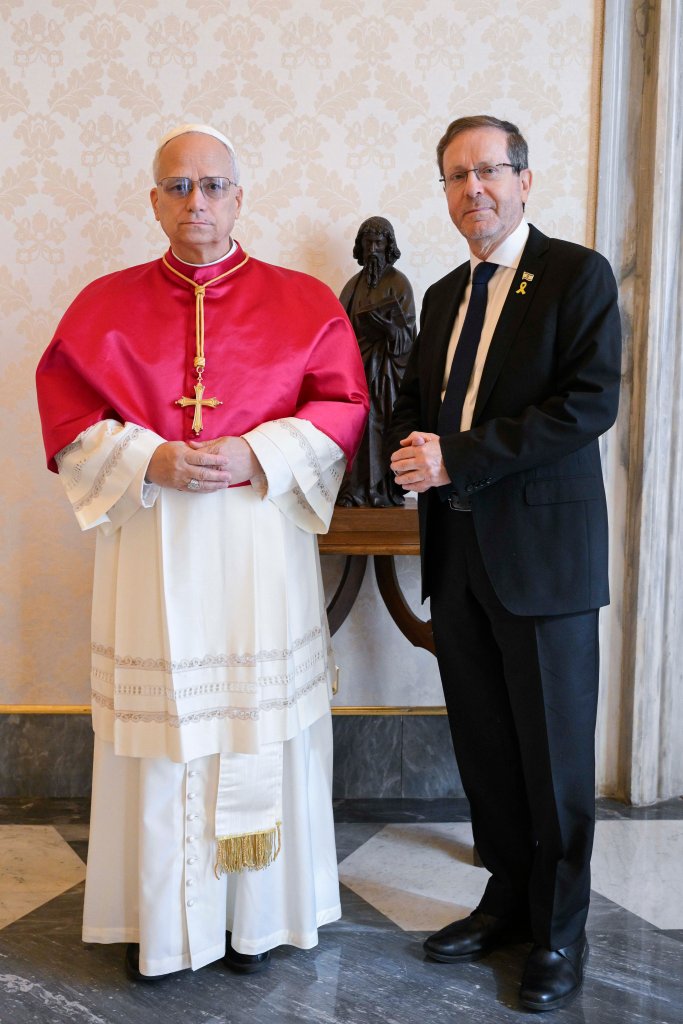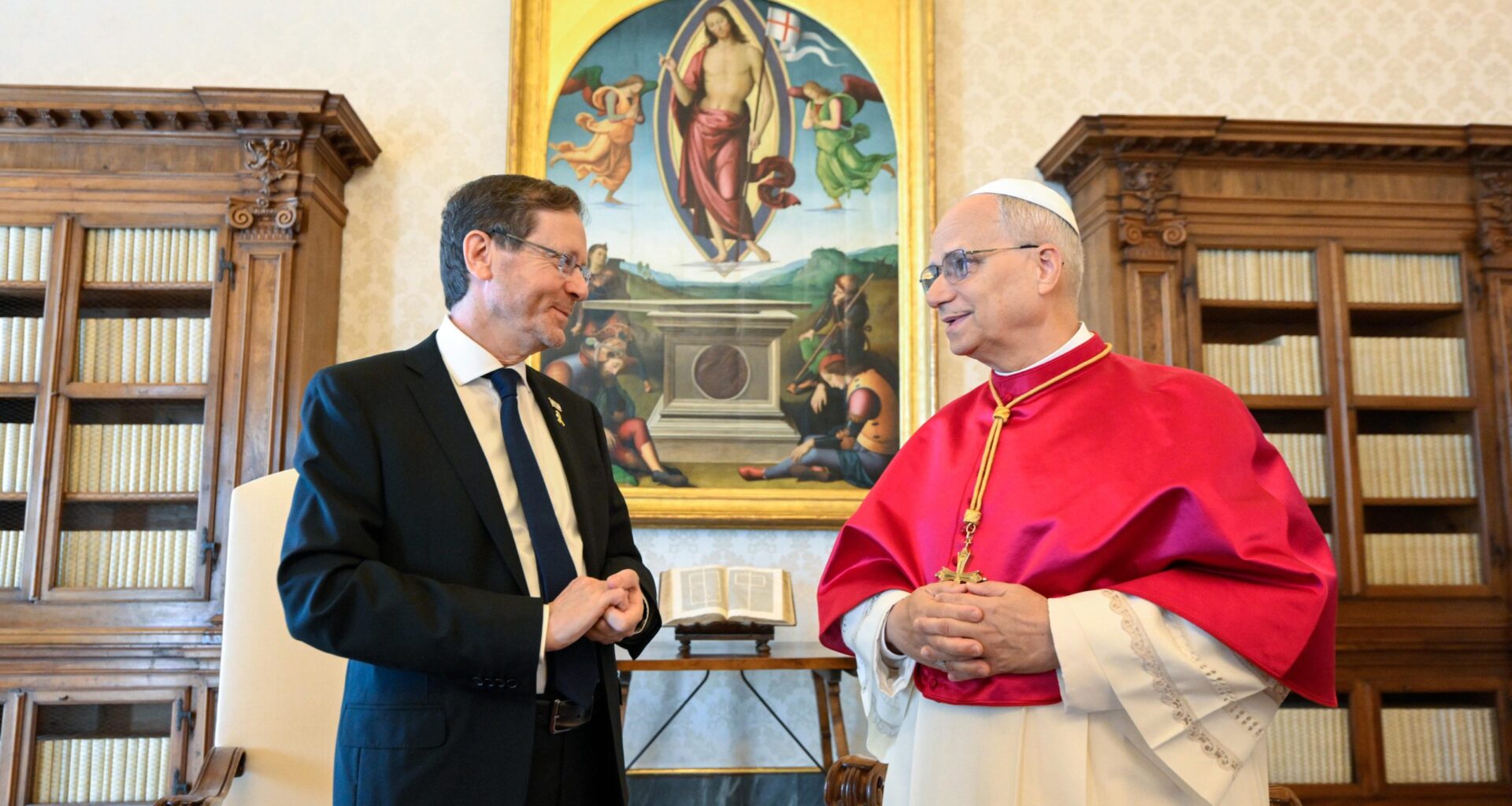“The tragic situation in Gaza” and the hope for “speedy resumption of negotiations” leading to the release of the hostages, a permanent ceasefire, the provision of humanitarian aid and a two-state solution as the path to lasting peace in the Middle East were at the heart of the conversations between Pope Leo XIV, his top diplomatic advisors and Israel’s President Isaac Herzog at the Vatican on Sept. 4, according to the statement issued by the Vatican hours later.
Mr. Herzog, whose role as Israel’s president is largely ceremonial, arrived at the Vatican under extraordinary security measures just before 10 a.m. for his private audience with Pope Leo, which lasted 30 minutes, an informed Vatican source who asked to remain anonymous told America. It was their second meeting; they met for the first time briefly at the end of Leo’s inauguration Mass on May 18.
Afterward, the Israeli president met with Cardinal Pietro Parolin, the Vatican secretary of state, and Archbishop Paul Gallagher, the foreign minister. All the conversations were conducted in English, without the need for translators. According to the Italian news agency ANSA, the entire encounter, including a visit to the Vatican Library, lasted for two hours and 45 minutes. Afterward, Mr. Herzog’s motorcade of 15 vehicles left Vatican City, where the Via della Conciliazione and the colonnade were closed to traffic and patrolled by Carabinieri and police officers.
The Vatican issued a carefully worded statement just before 2:30 p.m. (Rome time) that described the talks as “cordial.” It said the pope, his advisors and the president discussed “the political and social situation in the Middle East…where numerous conflicts persist, with particular attention given to the tragic situation in Gaza.”
The statement makes clear that the main focus was the almost two-year conflict in Gaza that has caused the deaths of more than 62,000 Palestinians, including 18,000 children. The war began on Oct. 7, 2023, when Hamas attacked Israel, killing about 1,200 people and taking 251 hostages; 50 hostages remain in Gaza, and Israel believes 20 are still alive. As Pope Leo and his advisors spoke with President Herzog, Israeli forces continued their assault on Gaza City, home to almost one million people, many of whom are suffering from fear and starvation.
According to the Vatican, the conversations expressed hope “for a speedy resumption of negotiations between Israelis and Palestinians so that, with courageous decisions and the willingness of both parties, as well as the support of the international community, the release of all hostages can be achieved, a permanent ceasefire reached with urgency, the safe entry of humanitarian aid into the most affected areas be facilitated, and full respect for humanitarian law be ensured, together with the legitimate aspirations of the two peoples.”
The Vatican statement said Pope Leo, his advisors and President Herzog engaged in a discussion “about how to ensure a future for the Palestinian people, thus contributing decisively to peace and stability in the region.” It said that “the Holy See reiterated its view that a two-state solution is the only way out of the current war.”
 Pope Leo XIV and Israeli President Isaac Herzog pose for a photo in the library of the Apostolic Palace at the Vatican Sept. 4, 2025. Credit: CNS photo/Vatican Media
Pope Leo XIV and Israeli President Isaac Herzog pose for a photo in the library of the Apostolic Palace at the Vatican Sept. 4, 2025. Credit: CNS photo/Vatican MediaThe Israeli government under Prime Minister Netanyahu has rejected a two-state solution. The Holy See recognized Palestine as a state in 2015, and today, 147 of the 193 member states of the United Nations also recognize Palestine as a state.
The Vatican statement said that during the visit, the pope, his advisors and the Israeli president also talked about “what is happening in the West Bank” and “the important question of the city of Jerusalem.” The city is considered a sacred place to the three monotheistic religions: Judaism, Christianity and Islam. The Vatican is also deeply concerned about the recent attempts by Israel to annex a part of the West Bank in a further effort to weaken the possibility of a two-state solution.
On a positive note, however, the Vatican statement said that “there was agreement on the historical value of the relations between the Holy See and Israel.” The two sides established diplomatic relations on Dec. 30, 1993, and opened embassies and exchanged ambassadors in 1994. Although it was agreed then that other issues regarding the legal and tax status of Catholic Church institutions in Israel were to be addressed soon after, much still remains to be done.
Today’s statement touched on this when it said that in this morning’s conversations between the two sides, “A number of issues were also addressed concerning relations between the civil Authorities and the local Church, with particular attention to the importance of Christian communities and their commitment, both locally and throughout the Middle East, to human and social development, especially in the areas of education, the promotion of social cohesion, and regional stability.”
Sources at the Vatican think that it is likely that Pope Leo and his advisors also talked with President Herzog about the situation of the Catholic Holy Family parish in Gaza City, where some 500 persons, young and old, including persons with disabilities, have taken refuge. Together with the priests and nuns who serve the parish, they are defying Israeli orders to evacuate the compound. The pope has spoken out recently against the forced evacuation of people from their homes and homeland.
After the visit and one hour before the Vatican issued its statement, President Herzog wrote in a post on X, “I am deeply thankful to @Pontifex Pope Leo XIV for the warm welcome today at the Vatican.”
“Above all else, Israel is striving in every possible way to bring home the hostages held in brutal captivity by Hamas,” he wrote. “Israel yearns for a day when the peoples of the Middle East – the Children of Abraham – will live together in peace, partnership, and hope.”
President Herzog said, “All leaders of faith and goodwill must stand united in calling for the immediate release of the hostages as the first and essential step toward a better future for the entire region.” He made no mention, however, of a ceasefire or an end to the war in Gaza.
He reaffirmed that “The State of Israel is committed to freedom of religion for all faiths, and determined to continue working for peace, tranquility, and stability throughout the region,” and said that “Israel is proud of its Christian community and dedicated to ensuring the security and wellbeing of Christian communities in the Holy Land and throughout the Middle East.”
He concluded: “The Pope’s inspiration and leadership in the struggle against hatred and violence, and in promoting peace around the world, is valued and vital. I look forward to deepening our cooperation for a better future of justice and compassion.”
When he came for the inauguration ceremony on May 18, President Herzog said he would invite Pope Leo to visit the Holy Land. There was no mention of this in his social media post; it remains to be seen whether he issued the invitation during his audience with the pope.
Related
